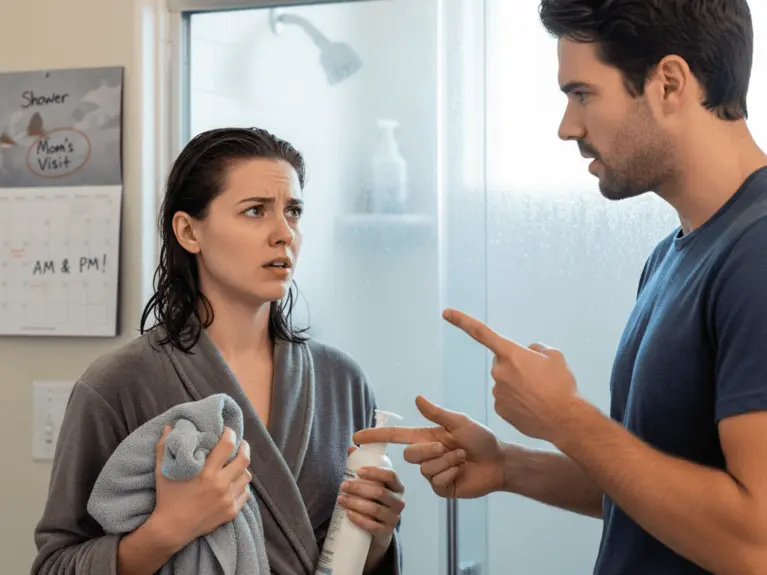Evelyn slid her key into the lock, but Aaron blocked the door with a sanitizer in hand and a calm smile. “Wrists,” he said, misting her like contraband while neighbors pretended not to stare. “Shoes on the line. Bag in the bin. Shower—now.” He handed over a printed ENTRY PROTOCOL to her.
Steam rose as he timed her from outside, voice gentle, precise. “Two minutes to lather. Ten for nails.” She watched droplets race the mirror’s edge and felt a prickle of disbelief: when did caring start sounding like customs control? When did home become the checkpoint she had to clear?
The mirror carried a checklist as well: rinse sequence, towel fold, door handle wipe. “Welcome back,” he called, affectionately inspecting her. Evelyn pressed her palms to the bedroom porcelain to steady herself. Somewhere between affection and audit, something had shifted. This, she realized, was new, but perhaps not entirely new either…
Five months ago, everything had been great. They met at a bookstore café after an author finished speaking about her latest release. When they got talking, he suggested coffee. He even managed to remember her order perfectly. He listened as people rarely do, like there was nothing more interesting than the sentence she hadn’t finished.

Dates unfurled with easy precision: gallery on Friday, riverside walk at dusk, a tucked-away place for soup. He’d checked opening times, booked windowside seats, and carried an umbrella on rainy evenings with foresight. Reliability felt like a warm coat; she slipped into it and discovered it fit her well, especially after a series of unreliable romantic partners.
He walked her home and never reached for more than she offered. When her kitchen tap leaked, he fixed it with a wrench from his bag. His green flags were too many to ignore—courtesy, competence, and attention. Evelyn told friends he might be the kindest person she’d ever dated.

He noticed her preferences no one else remembered—her special brew of tea, extra pillows, low-volume playlists, pickles on the side because brine overpowered other flavors. He brought her flowers, choosing ones that wouldn’t trigger her sinuses. It felt like love that eluded most women, even those who searched for it desperately.
When she caught a cold, he arrived with soup and fresh sheets, humming absentmindedly as he wiped the counter while chatting. The cloth moved in easy circles. She said to herself: What a considerate habit. This thought passed like weather—pleasant, unremarkable, not yet a forecast of what was to be.
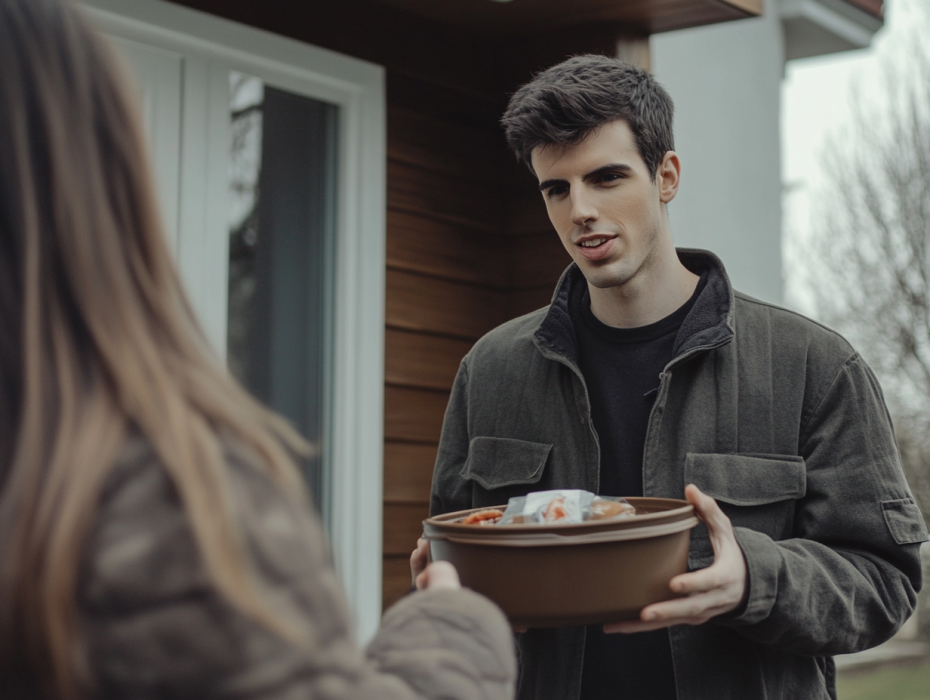
Things between them sped up with her promotion. It came with a brutal commute. Her flat was a train and two bus rides from the new office; his was only three stops and a leisurely stroll away. “Come stay here until you find your bearings,” he suggested, careful and practical. It sounded as sensible as carrying rain boots when the clouds darkened.
She moved in with her stuff, a box of books, full of optimism. The first week glowed: shared playlists shuffling between Taylor Swift and new podcasts, shared shelves of their stuff, coffee appearing precisely when mornings needed saving. Evelyn texted her sister: He’s a dream. Everything just…works.

He made space for her without comment: half a closet, a toothbrush twin to his, her favorite mug on the reachable shelf. Even his quiet felt welcoming. She slept deeply, the way you sleep near someone who reads your moods or hands you a sweater even before you start to shiver.
Friends met him and called him old-school in the best way. He never interrupted, remembered names, offered to remove their coats, and poured them drink refills without overdoing any of it. Evelyn, who had dated improvisers and vanishing acts before him, relaxed into the gentleness of a planned existence.
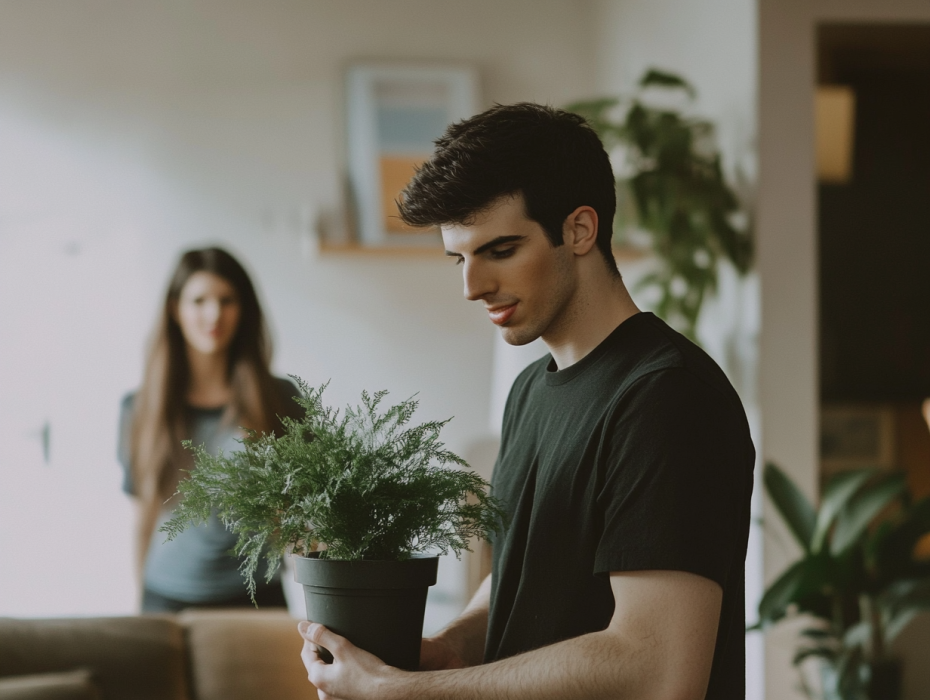
He bought a fern and named it Miles, “It’ll be our plant child.” They arranged books by color, laughing at the accidental rainbow. He stepped back, head tilted. “Looks intentional,” he said, pleased. Intentional felt like a new way to say beautiful—tidy, hopeful, and harmless.
“Let’s try a house rhythm,” he suggested, sticking a calendar to the fridge. Chores were divided like generous slices of cake, without obvious scorekeeping, just boxes they’d cross off together. It sounded like good teamwork. Evelyn signed her initials in the corner for fun, like a contract with joy.
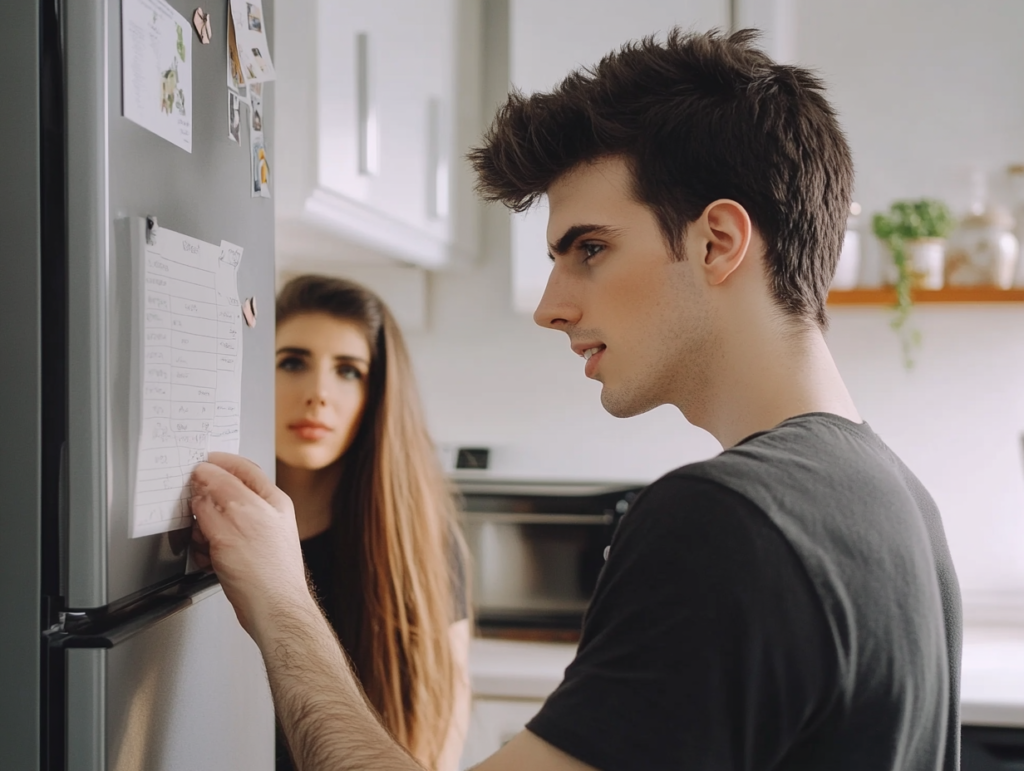
Nothing jarred; it was all soft-edged and solved problems. She let herself believe she’d stumbled into a rare balance of tenderness and structure—safe spontaneity she called it. If, at all, there were hairline cracks, they hid themselves under the shine of everything finally going right.
The first “note” of discord arrived light as a feather. “Coats facing left makes the entryway feel roomier,” he said, turning the hangers with a gentle flourish. She grinned and saluted. Why not? The left was as good as the other way. The door opened, the hallway breathed; it felt like a magician’s small trick that tidied the air.

The second was a murmured preference. “Half a glass of wine is ideal. You will savor it more.” He topped hers to a neat mark that mirrored his. It sounded like a sommelier’s secret, offered kindly. She took a sip and smiled. Savoring is lovely, she thought. Half is fine.
Shower talk came up next. “Two showers help sleep,” he said, like a podcast tip. Evelyn tried it twice that week and slept hard. Correlation felt like proof. She didn’t see the thread yet. It was only a handful of suggestions that seemed to help rather than bind her..

One morning, her makeup migrated into labeled pouches. “So you can find things quickly,” he offered, proud of the new drawer system. It was charming—tidy, considerate—and oddly official. She set mascara in Eyes, blush in Cheeks, and teased him for perhaps being the world’s only boyfriend to know the intricacies of women’s makeup.
At dinner, he nudged her shoulders with a smile. “Sit a bit taller; it helps digestion.” The phrase was affectionate, scholarly, and impossible to argue with without sounding anti-digestion. She straightened up, amused by the courtly tap of his finger. “Ergonomic love,” he said, and they laughed.

The first time she skipped the second shower, he said “No worries” and meant it, or perhaps tried to. He wiped the doorknob after she touched it, then the light switch, then his own hands, moving casually, humming. A lemon brightness lingered in the air after him. She did not attach much importance to the event.
When she got herself a soft-bristle toothbrush, it was replaced by one that had “better” medium-soft bristles. The box promised superior hygiene in a lab report kind of font. “I bought extras,” he said, pleased. She thanked him and wondered a bit before shrugging off the incident.

He forked and served dinner in proportions he swore would keep her “light, full, but not sluggish.” It looked pretty—greens geometrically supporting grains, and protein placed in a symmetry, with the promise of good health. She ate and felt fine, but something edged inside her: whose appetite was she filling, and why did it have to be so precise?
The kettle began living on a timer. “For optimal sleep,” he announced, setting the seconds like a conductor. The tea tasted great. The trouble with so many small edits was that they worked pretty well. It was hard to argue with a system designed to keep you healthy, rested, and performing at your peak. She said nothing.
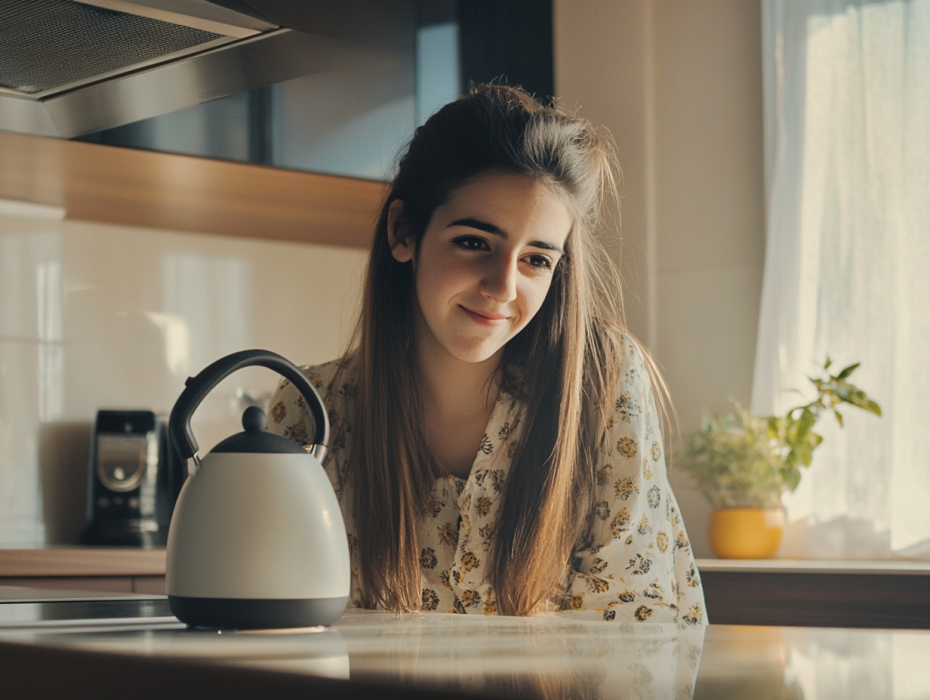
Evelyn laughed it off—everyone was entitled to their quirks. She told herself that a person can love slightly differently than you do. Her compliance, at first, came wrapped in affection. But unconsciously, she noticed how his approval brightened when she aligned, and how conversation thinned when she didn’t.
A new row of chores appeared on the fridge calendar: Reset/Refresh (PM). It sounded spa-like, not supervisory. Boxes waited for ticks. When she forgot to mark one, he ticked it for her with a polite “All set,” a kindness that felt oddly like being signed on her behalf.
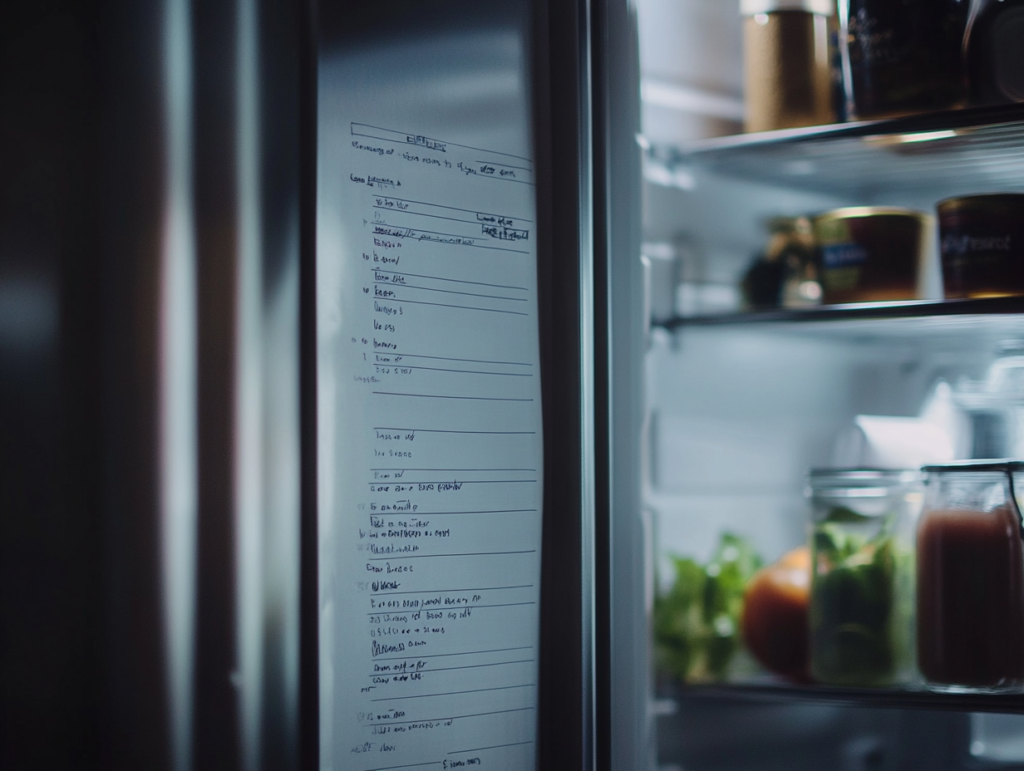
He called reminders “courtesies.” “Phone screen down at meals,” “Keys in the tray by the door,” “Wipe sink after brushing—water marks spread.” Each request alone was reasonable; together they arranged themselves like fence posts, low enough to step over, frequent enough to keep her on a path she didn’t choose.
“Mom always said order protects love,” he mentioned lightly, rinsing glasses. The sentence passed through the room and hung there, like a framed motto no one had agreed to hang. Evelyn smiled, curious about the mother who’d said it, and where order ended and love began.

She began feeling ever so slightly—not punished or scolded—graded. A raised eyebrow instead of a red pen. A small nod rewarded alignment. She looked for the middle ground between relief and resistance and found herself standing in it on most nights, careful not to make a splash.
The next morning, an ENTRY PROTOCOL appeared on the inside of the front door: spray sanitizer, shoes, bag, shower. Printed steps, boxes to tick. “It keeps the outside outside,” he said, affectionate but unyielding. Evelyn held the paper, smiling because he was smiling, feeling the first, faint ache of a process queue.
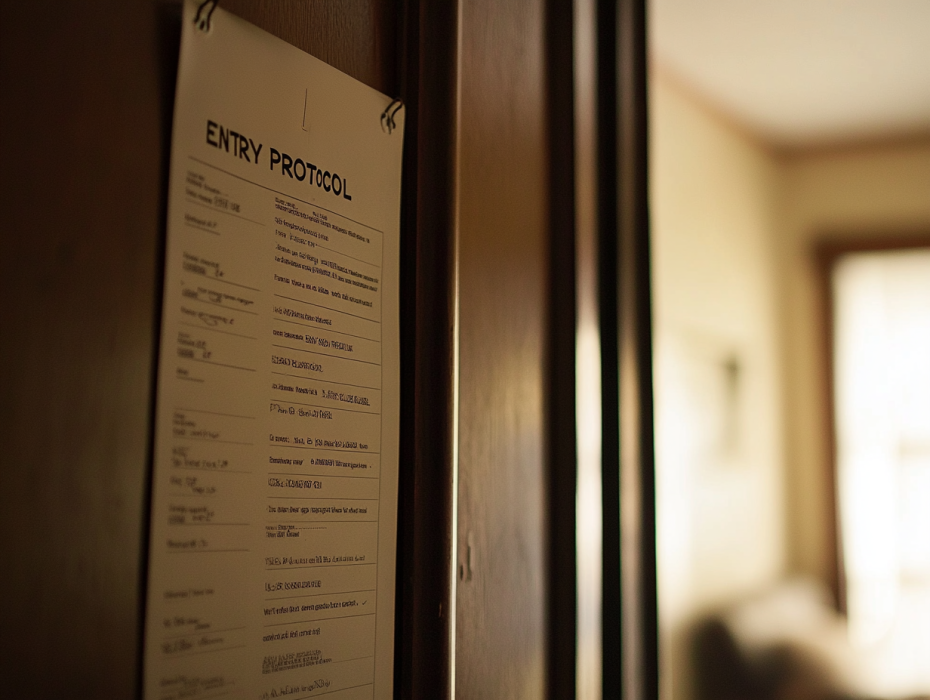
The ENTRY PROTOCOL became a laminated sheet by the door, pen on a string like a voting booth. She memorized the steps: Spray, shoes, bag, shower. Boxes to tick, even if she only stepped out for mail. “It keeps the outside outside,” he said again, kissing the air near her forehead, but never quite landing.
On days she stayed out longer—errands, a drink with Maya—he tilted his cheek instead of his mouth. “You’ve been out a while,” he’d murmur, with a trace of apology or irritation—she couldn’t tell. She tasted absence like metal, then laughed it off, because a gentle refusal still counts as gentle. Right?
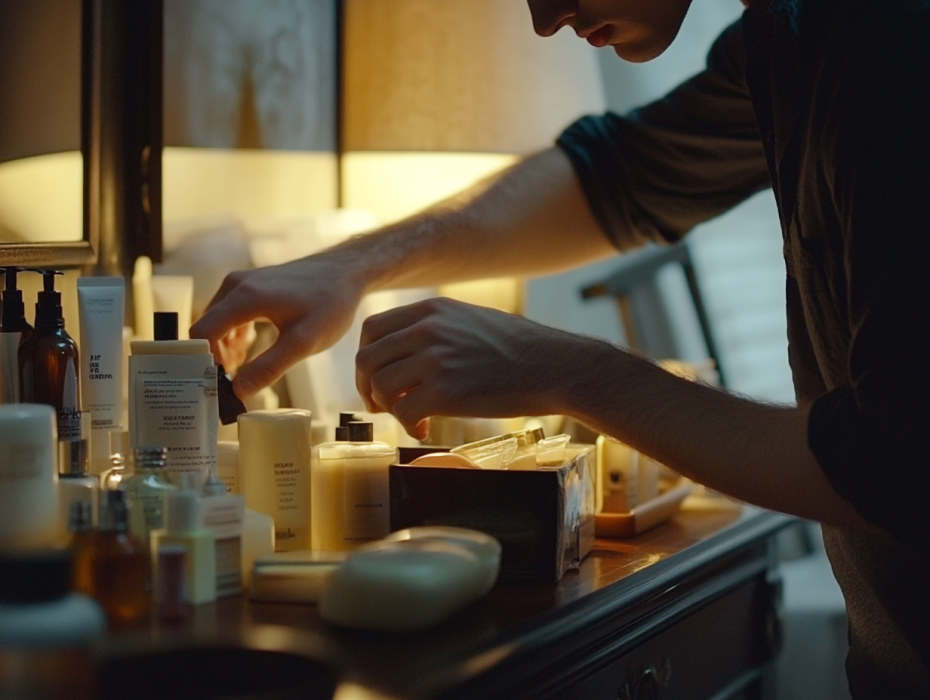
Unscented pots, jars, and tubes arrived in thoughtful subscriptions: soap, lotion, detergent stamped free of fragrance. Her jasmine perfume moved to a high shelf “for special occasions.” It never quite fit the schedule. “Smell is memory,” he said. “Let’s keep ours clean.” She nodded, secretly grieving the tiny cloud of scent that used to follow her.
Laundry nights gained a new ritual. He lifted shirts to the light, hunting “lint residue” like a detective of minor crimes. “Perfect,” he’d say when fibers behaved; “almost,” when they didn’t. Pleasure and purpose shone on his face so brightly that she felt obliged to accept the invisible rubric.
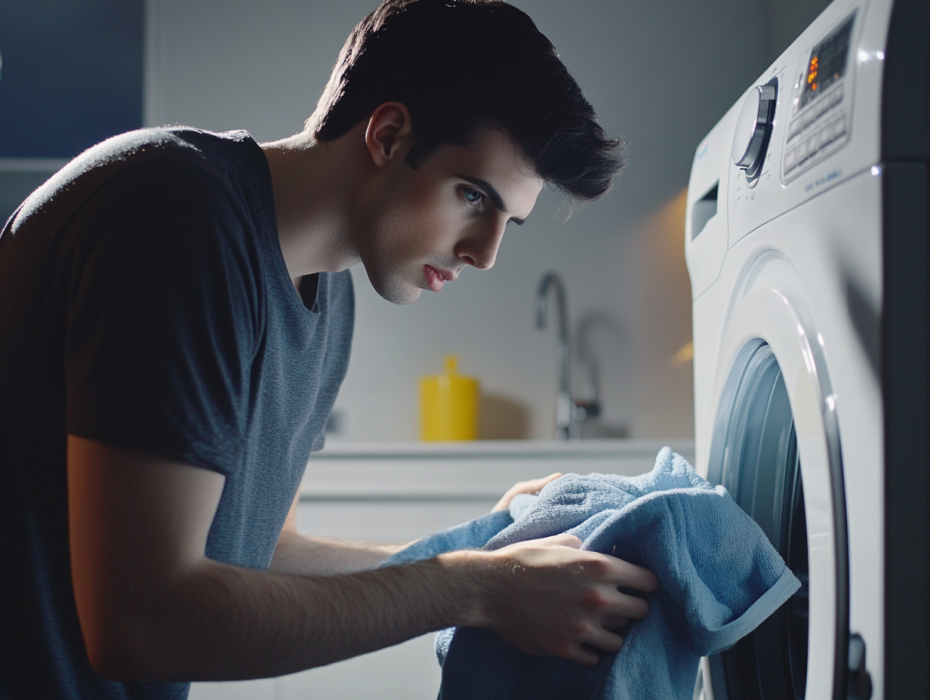
At dinner, he adjusted her napkin by a degree, smiling as if he’d rescued her from some minor catastrophe. “Angles flatter the table,” he teased. At this point, she wanted to ask what angles flattered a life, but the food was hot, his smile was kind, and she thought it too petty a question to ask.
She began showering at work sometimes, stealing ten minutes of unsupervised steam after the gym. In that locker room, water was just water—no countdown nor commentary. She’d return home smelling the same but feeling different, because privacy had a scent she could keep to herself.

A colleague’s dinner loomed; Aaron suggested they “rehearse greetings.” Not too bright, not too soft, shoulders free but straight. Evelyn practiced lines like she was auditioning to play herself. He clapped, delighted. “You’ll be perfect,” he promised. She wondered when “perfection” had replaced “interesting” and “beautiful” in his list of compliments.
At night, he whispered, “Don’t forget the second wash,” like a lullaby, smoothing the sheets. She’d nod, obedient through sleepiness. Then, after the shower, she’d lie awake counting tiles on the ceiling instead of sheep. The apartment hummed with appliances and approval, gentle and relentless.

Looking for a tax form in his Drive, she found a tidy spreadsheet named Home Standards. Tabs bloomed across the bottom: Kitchen Flow, Laundry QC, Quiet Hours. The entries and instructions were immaculate. She scrolled and felt a cold draft: affection formatted into cells.
One tab sat apart: Guest Protocol (Mom). It listed scent guidelines, greeting cadence, portion sizes, posture cues, and even acceptable topics to speak on. Next to Breathing style, he’d typed: In through the nose—for calm. Evelyn stared at the note. The words were concrete. Their effect on her wasn’t.
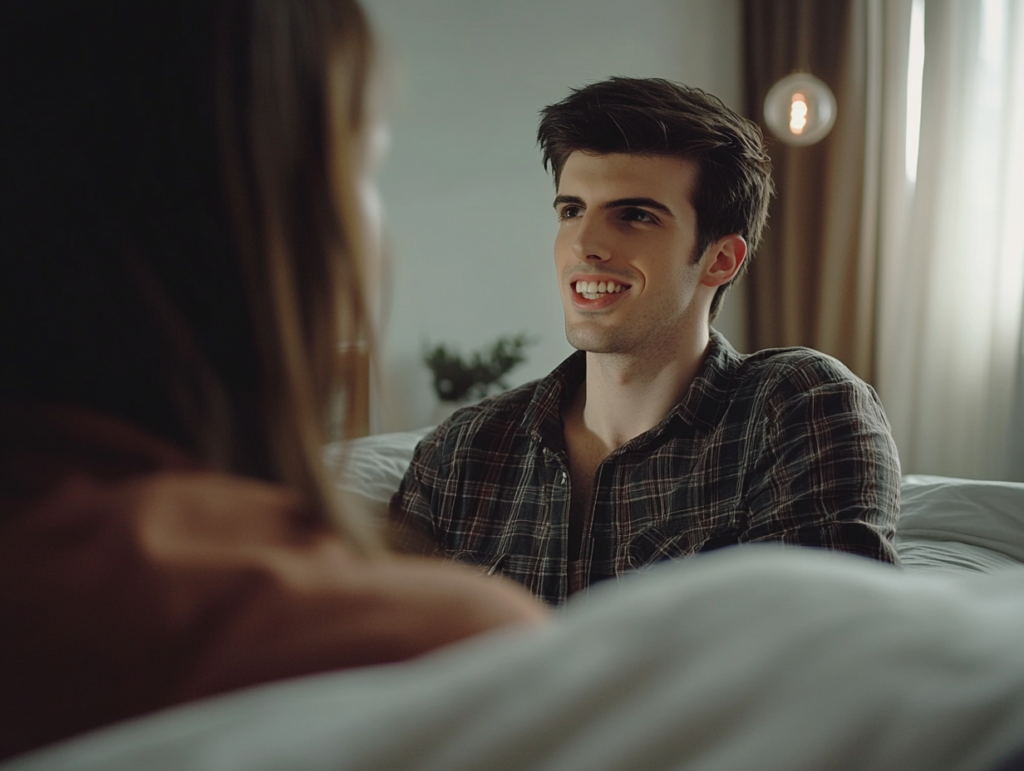
That evening, he brightened. “We should visit my mother,” he said. “She’s particular, but she’s kind. You’ll love her. She always notices when people take care of themselves.” He meant it as praise; she heard it as a test. Still, she smiled, because smiling showed love and understanding.
Preparations began like spring cleaning. Perfume retired. He suggested a pale lilac dress—“softness is grace”—and smaller portions “so you’ll feel light.” She let him choose the bakery gift because choosing became easier when someone else made decisions for you. She watched the ribbon being flattened to perfection.

They practiced her hello: the words, pause; hands visible, shoulders level. “Not too bright, nor too soft,” he repeated, the Goldilocks of greetings. She tried versions of herself in the mirror until they all sounded like public service announcements. He smiled. She hid a sigh behind it.
That night, Evelyn dreamed of mirrors in her own hallway. She looked at herself in one. Then another one, mirroring the first, gently polished her appearance, which was further corrected by another. She moved from mirror to mirror, seemingly on a quest to improve her appearance, till she couldn’t recognize the woman in the last one.
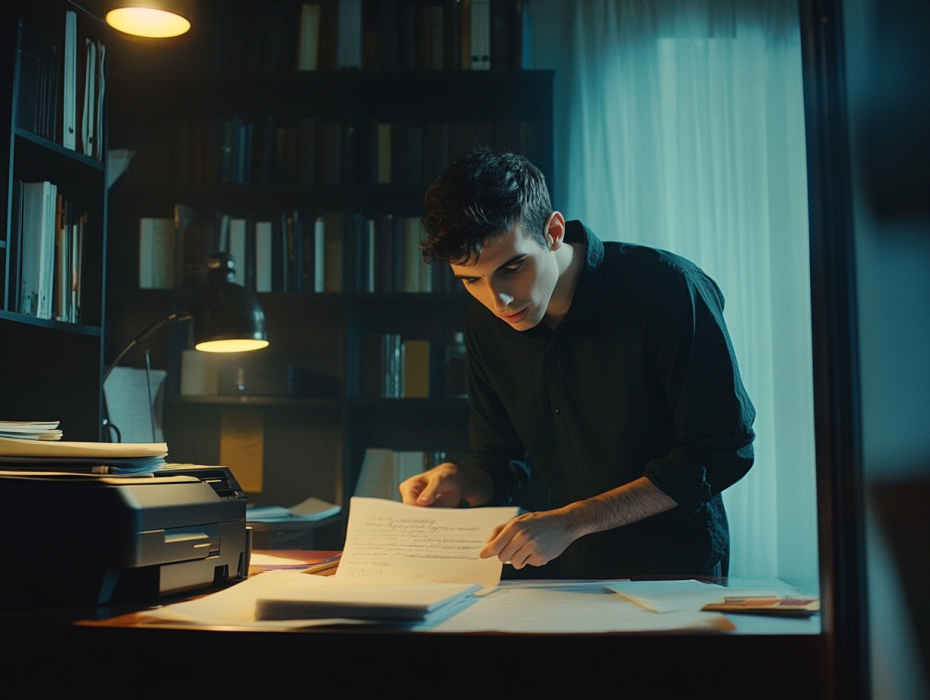
Sitting at the table, she watched him print fresh copies of the ENTRY PROTOCOL “in case we lose one.” He whistled, content, loving her in the only language of love he knew. Evelyn traced a box with her finger and wondered when love had become a queue you couldn’t skip.
The childhood home appeared—gravel combed into rows, hedges trimmed to identical heights, and window panes without a fingerprint in sight. Before they could knock, the door swung open. “Aaron,” his mother said warmly, then to Evelyn, “Welcome. Shoulders back, dear. Posture is part of first impressions.”

Inside, light fell on a hallway of perfectly aligned frames. In every photo, Aaron mirrored his mother’s posture at different ages—chins lifted, shoulders squared, and smiles tuned to the same polite wattage. Evelyn felt a hush in the air, the kind that follows rules even when no one speaks.
She had arranged special slippers for them to wear indoors. “Outdoor shoes heel-to-heel,” his mother murmured, kind but exacting. Evelyn complied; the woman nudged Aaron’s pair by a millimeter, the correction so gentle it almost felt like affection. Aaron chuckled, obedient and practiced. The sound was pleasant but a little heartbreaking.
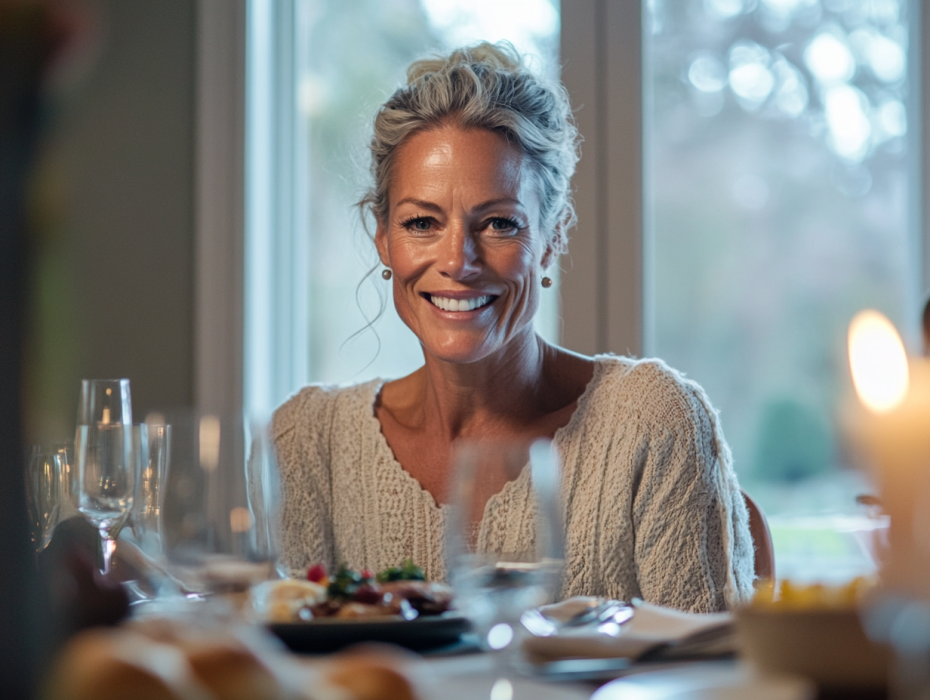
Lunch landed on white plates like geometry toolboxes—equal distances between utensils and bread slices indistinguishable by size. “We prefer balance,” his mother said, offering butter. Evelyn reached, and the napkin at her wrist was rotated by a degree. “Angles flatter the table,” the woman smiled. Evelyn nodded.
When Aaron poured water, she tapped his wrist. “Not that full, darling. We don’t drown our glasses.” He corrected his pour with a small, boyish grin, received a satisfied nod, and exhaled like a student being awarded a good grade despite minor mistakes.

Conversation came preset, too. Health, work, and weather were the only topics under discussion. The laughter was genuinely pleasant, if controlled and curated. Evelyn was telling a work anecdote when, midway, the woman said, “Breathe in through the nose; it projects calmness.” Aaron inhaled on cue, a reflex born of years of devotion.
Compliments arrived attached to adjustments. “Lovely dress. That shade is grace.” A beat later, it was followed by “Chin slightly lower—photographs come out better.” Evelyn complied, the way one does in group photos to keep the peace. Aaron’s shoulders eased at the sight, relief visibly showing his sense of gratitude.
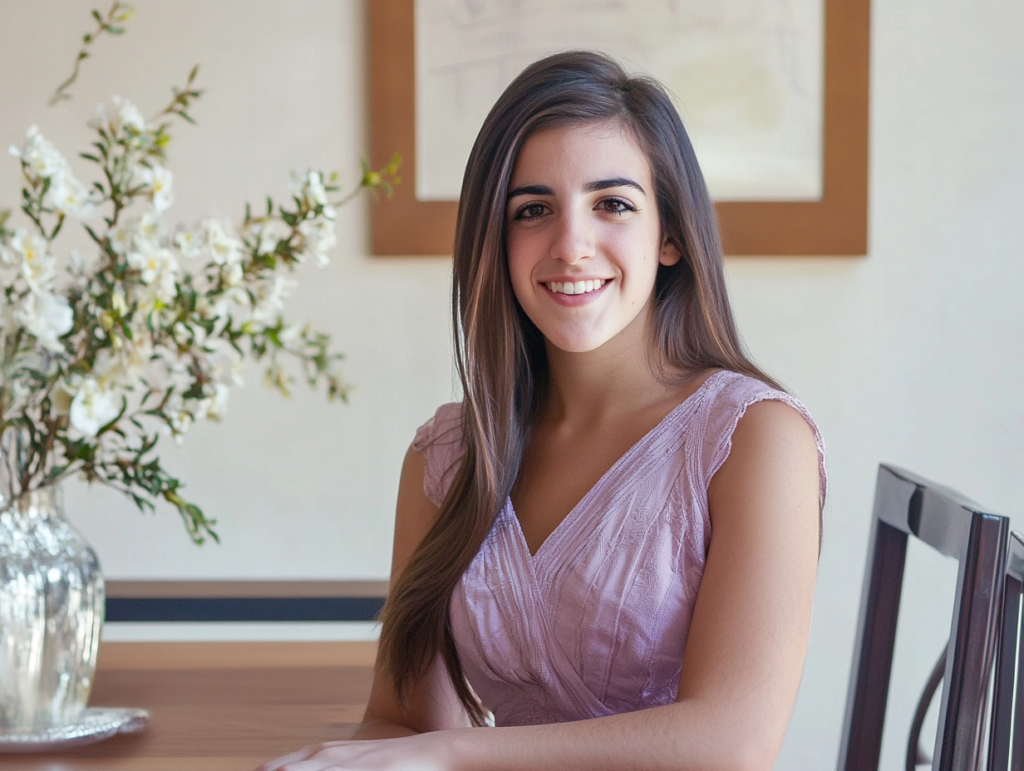
Bite sizes were moderated, salt passed counterclockwise, and forks rested at precise angles. None of it seemed unkind, but all of it was binding. Evelyn thought of seatbelts that tighten even when you haven’t crashed, the soft restraint of a system convinced it is saving you from yourself.
“How do you two handle conflict?” his mother asked, as if discussing tea strength. “We have routines,” Aaron replied. The woman brightened. “Routines rescue love.” The sentence clicked gently into place like a latch. Evelyn felt it close around her existence.
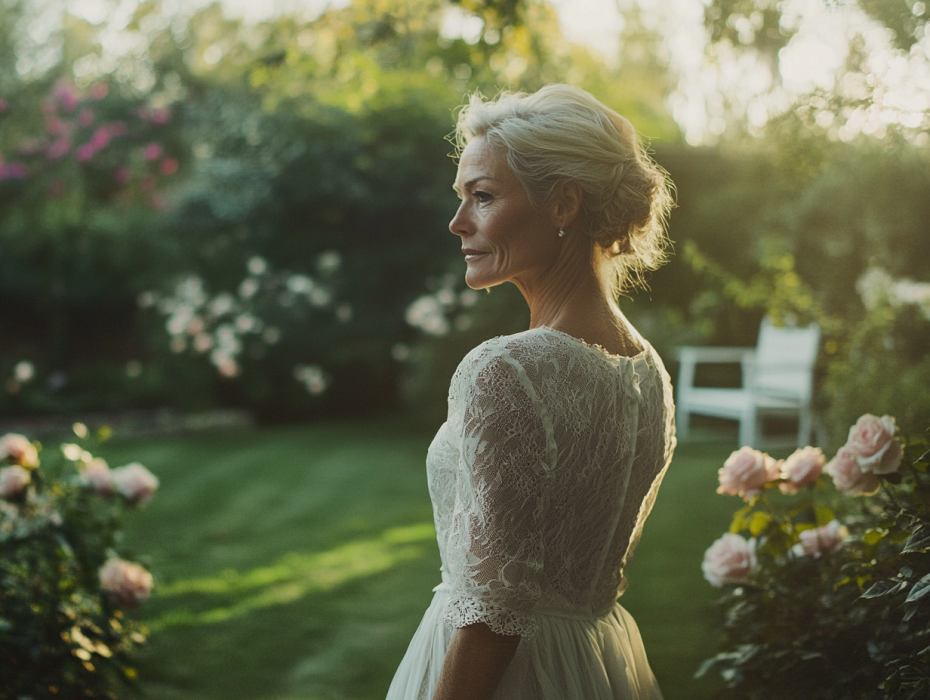
The garden tour revealed roses trained into arches and hedges in flawless symmetry. “Even nature can be improved with guidance,” his mother said, trimming a leaf by two breaths. Aaron watched proudly. Evelyn pictured a wildflower sneaking in, then standing very still until its color was permitted and its edges trimmed into rose bush-like submission.
Back inside, a cabinet displayed labeled containers—napkins, runners, candles, spare etiquette. Evelyn laughed softly at the last one. “A family joke?” “A philosophy,” his mother replied, smiling perfectly. “Order makes space for joy.” Evelyn considered joy that did not need a label. Or was that not possible?

At the sink, his mother demonstrated her “quiet rinse.” “Noise agitates, and agitation travels,” she said, barely rippling the water. Evelyn mirrored the motion. “Lovely,” the woman approved. The praise managed to both brighten and tighten at once. Evelyn was feeling suffocated.
In the hallway, Evelyn lingered at a photo of small Aaron with squared shoulders and a careful smile. “He learned to hold himself well,” his mother said. The phrase rang in Evelyn’s chest differently: He learned to hold himself in. It was a whole childhood reined in.

Aaron fetched coats without being asked, folded along seams as if fabric had standards. His mother adjusted a sleeve by a whisper and kissed his cheek. It looked like love, and in many ways it may have been love. But it also looked like a lesson that never seemed to end.
At the door, his mother thanked Evelyn for visiting. “You present yourself thoughtfully,” she said. “It honors everyone’s time and efforts.” There was genuine warmth in it, and a measurement, too, like a hand adjusting a scale to work properly.

On the driveway, gravel barely shifted under their shoes. Aaron stood taller, his frame radiating health, confidence, and perfect manliness. “She liked you,” he said, eyes bright with the relief of a report card returned unblemished. “I could tell,” Evelyn answered, squeezing his hand once.
In the car, he adjusted the rearview mirror twice, then a third time for good measure. The habit seemed to soothe him, a small ritual to prove the world worked well when looked at in the right angle. Evelyn watched his hands and saw in them a kindness shaped into inherited control.

The road unspooled, and fields blurred before them. His shoulders stayed square as if a switch, somewhere behind his ribs, stayed on. Evelyn rested her head against the window and understood: the corrections at home weren’t about dirt or manners. They were the choreography of discipline masked as love.
As the town lights gathered ahead, she reached across the console and took his hand—unscripted, unmeasured. He didn’t pull it away. He squeezed back, quiet and surprised, like someone realizing for the first time that closeness can happen without a checklist. She held on and didn’t let go.

Back home, her dress hung straight from a hanger. Aaron stood in the hallway, hands at his sides, as if waiting for an assessment result. “She seemed happy,” he said. Evelyn nodded, then asked, “Were you?” The question felt new in the room, like fresh air.
He looked toward the bookshelf photo—child-Aaron, chin guided up by an invisible instruction. “We did well,” he said automatically, like reporting metrics. Evelyn stepped closer. “I asked if you were happy.” He swallowed, searching for a feeling that didn’t come pre-labeled. “I…suppose.”

“Maybe happiness isn’t always submission,” Evelyn said. “Today felt tight.” He exhaled, as if there was breath pent up. “She trained me to do everything right,” he said slowly. “It’s how love worked.” Evelyn nodded. “And then you tried to love me the same way—by correcting, keeping me inside the lines, isn’t that it?”
He winced, though he knew she was naming rather than blaming his instincts. “I thought I was protecting us,” he said softly. “From chaos. From shame.” The words sounded like jars from his mother’s cabinet, opened carefully. “It felt like protection,” Evelyn admitted. “Sometimes. Other times, it felt like disappearing into something I wasn’t.”
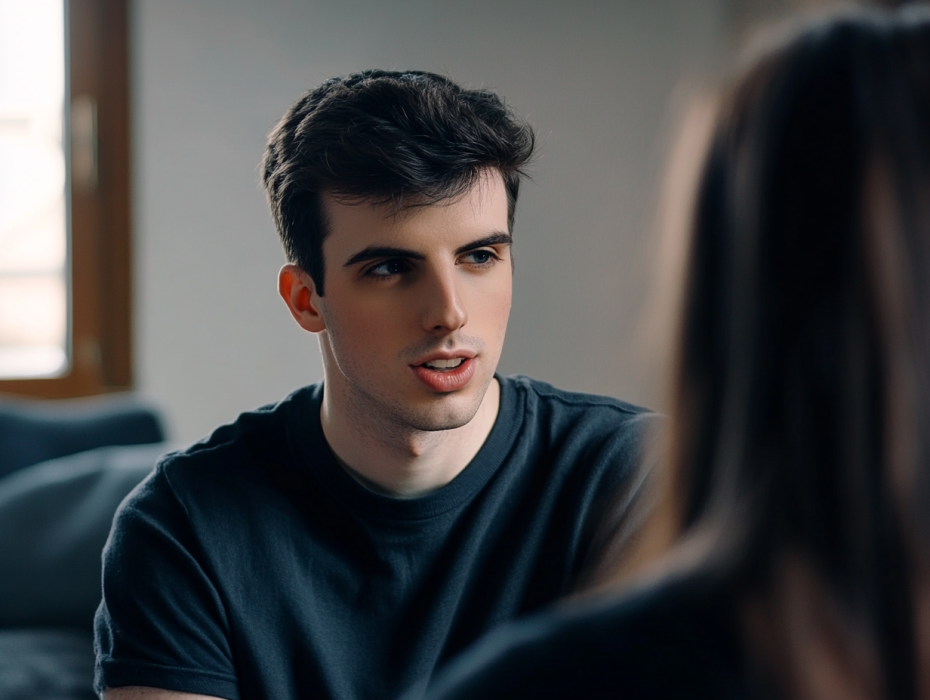
“I don’t know how to stop doing this,” he said, voice small. Evelyn took his hand. “Maybe we don’t have to stop all at once,” she replied. “We learn. We get help.” The word help didn’t bounce off the walls; it landed and stayed. He nodded once, as if granting himself permission for something.
The next morning, they made coffee and a list. It was a list of options. He ran through the list of therapists with words like anxiety, family systems, and boundaries written next to them. He hovered over boundaries long enough to smile, surprised by his own relief. “Structure that doesn’t squeeze,” Evelyn said. “Structure that holds,” he echoed, testing the phrase.

In session one, he sat very straight and answered everything like an exam. The therapist’s tone slowed the clock. “You learned that love arrives as correction,” she said. “What happens if love arrives as permission?” He glanced at Evelyn. She didn’t fill the silence. She nodded once, encouraging him to try answering it.
Therapy homework was odd but ordinary. Let a towel hang crooked. Plate your own dinner, uneven on purpose. Ask before suggesting. Aaron complied. When he fell back into an old habit, he caught himself mid-correction, cheeks flushing. “Do you want a suggestion?” he asked instead. Sometimes she did. Sometimes she wanted to be messy. Both were okay.
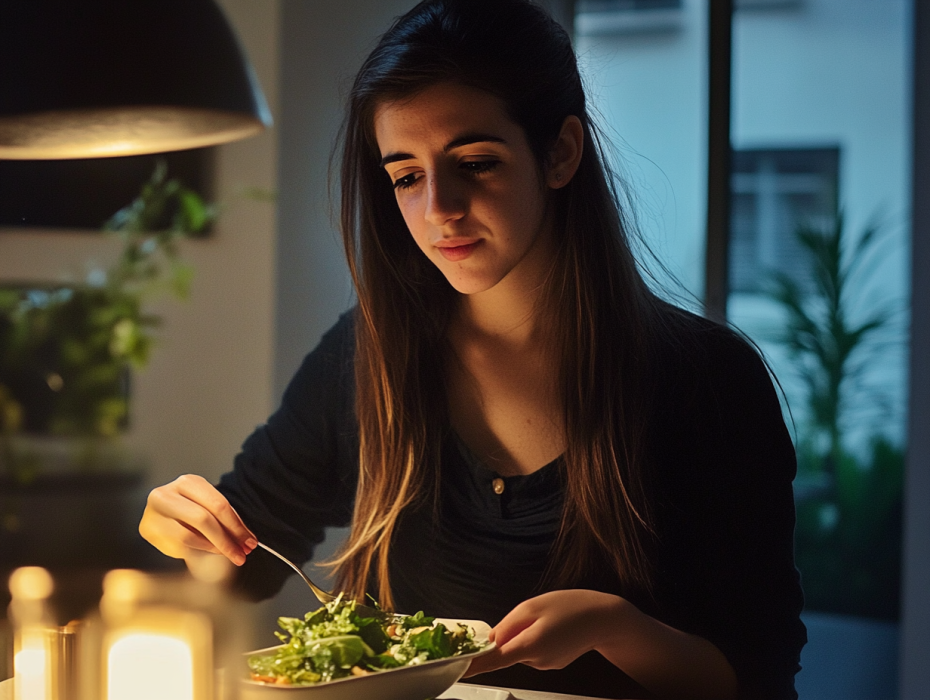
They named habits he’d called courtesies: inspecting, portioning, timing, wiping, rehearsing. Naming them made space. It was like stepping back from a painting to see the frame. “Right can include messy,” the therapist said. Aaron laughed once—short, bewildered—at the idea that crumbs did not have to be cleaned up at once.
Evelyn deliberately misaligned the salt and pepper. He noticed, inhaled, then let them be. The room didn’t collapse. Later, he nudged them just because he liked the look and laughed at himself. Preferences, he realized, could be realigned, too.

Showers discussed. “Once is fine,” he said tentatively one night, the sentence trembling at the edges like a window newly opened. Evelyn showered once. Nothing failed. The world didn’t stop turning. They watched a movie and ate popcorn that spilled a bit around them, and it was good. Later, they cleaned up together.
Consent replaced correction. “Would it help if I portioned?” he’d ask. Sometimes Evelyn said yes—on other days, she said no. She wanted her appetite to tell her what her body needed. He learned that closeness could mean offering without arranging, and receiving without revising.

He visited his mother alone. When he returned, he looked tired but lighter. “She adjusted my handshake,” he said, oddly amused. “I let her. Then I came home.” He didn’t add, and I didn’t bring the rules back. He didn’t need to say it. Evelyn could feel the air loosen.
During therapy, they practiced their language for turbulence. He learned to say, “I’m anxious; I want to correct,” instead of leading silent inspections. Evelyn said, “I feel managed,” instead of falling into compliance. The sentences sounded clumsy at first, then fluent enough to carry them through evenings that used to end in polite distance.
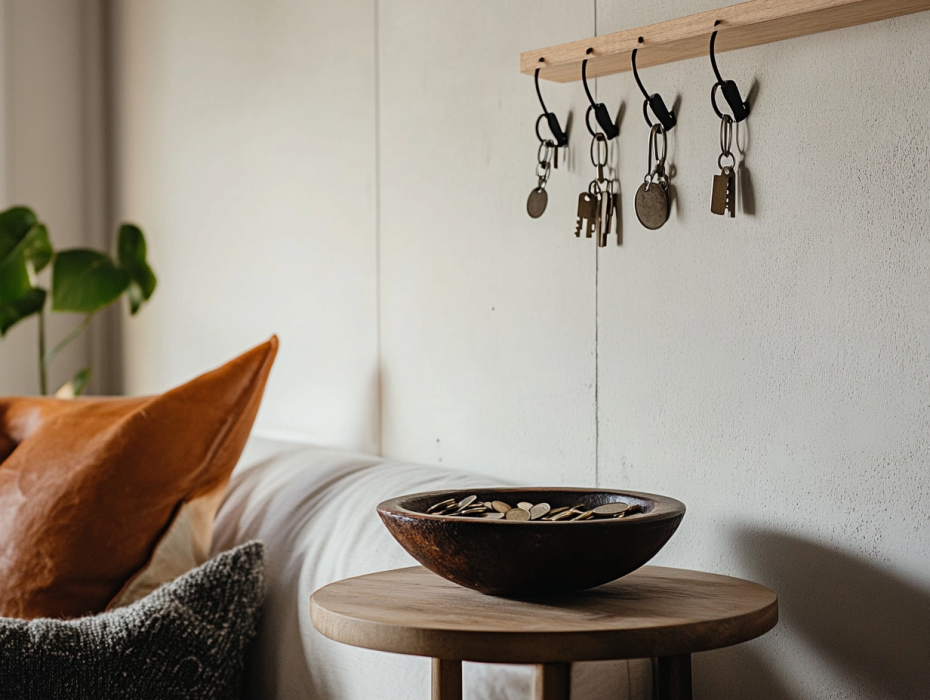
Days stacked up without a second shower. The ENTRY PROTOCOL was taken down, replaced by a small hook for keys and a bowl for coins. He left his shoes a little crooked, noticed it, but didn’t fix them. He grinned at the asymmetry like someone spotting a beautiful wildflower in a lawn.
Their apartment lit up. Napkins tilted, looking like sails. The fern, Miles, grew unruly. Evelyn poured her own wine—sometimes half, sometimes full. He poured his as he pleased. Choices sat at their table like new guests, welcome precisely because they varied.

One morning, he filled her glass completely and didn’t apologize. “You can want what you want,” he said, steady now. Evelyn raised the glass. “So can you.” Outside, the day was loud and bright. Inside, their love finally breathed without counting, and the room felt like home.
